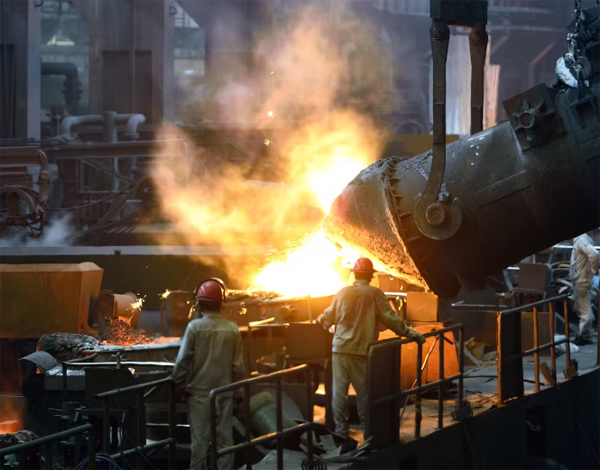
Steel production is a critical industry that serves as the backbone of modern civilization. It is essential to understand the significant role of various elements in the steelmaking process. Among these, calcium emerges as a crucial element due to its remarkable influence on the properties and quality of steel. This article explores the importance of calcium in steel production, highlighting its impact on refining, inclusion modification, desulfurization, and grain refinement.
Calcium plays a pivotal role in the refining stage of steel production. During refining, impurities such as sulfur, oxygen, and phosphorous are removed to enhance the steel's mechanical properties. Calcium is introduced into the steel melt in the form of calcium oxide (CaO) or calcium fluoride (CaF2), which reacts with these impurities to form stable compounds. For instance, calcium reacts with sulfur to form calcium sulfide (CaS), which has a higher melting point than the steel melt. As a result, the calcium sulfide floats to the surface, allowing for easy removal. By facilitating the removal of impurities, calcium contributes to the production of cleaner and higher-quality steel.
Inclusions, non-metallic particles present in steel, can severely affect its mechanical properties. Calcium has the ability to modify the nature and morphology of these inclusions, making them less harmful. During the steelmaking process, calcium reacts with oxygen and sulfur to form calcium oxide (CaO) and calcium sulfide (CaS), respectively. These compounds combine with the inclusions, leading to the formation of calcium-aluminate and calcium-silicate-based inclusions. These modified inclusions are more spherical and less detrimental to the mechanical properties of steel. They act as barriers, hindering crack propagation and improving the steel's toughness and resistance to fracture. Thus, the inclusion modification process, facilitated by calcium, contributes to the production of high-strength and high-performance steel.

Desulfurization is a crucial step in steel production as high sulfur content negatively impacts the steel's ductility and toughness. Calcium, in the form of calcium oxide (CaO) or calcium carbonate (CaCO3), is widely used in desulfurization processes. The addition of calcium compounds to the steel melt results in the formation of calcium sulfide (CaS), which has a higher melting point than the steel. Consequently, the calcium sulfide separates as a slag, allowing for easy removal. Moreover, calcium also aids in reducing the viscosity of the slag, enhancing its desulfurization efficiency. By effectively removing sulfur, calcium enables the production of high-quality steel with improved mechanical properties.
The grain size of steel significantly impacts its strength and toughness. Finer grain sizes are desirable for enhancing mechanical properties. Calcium, in the form of calcium aluminates (CaAl2O4) or calcium silicates (CaSiO3), acts as a grain refiner in steel production. These compounds, when added to the steel melt, promote the formation of fine-grained microstructures. The presence of calcium-rich particles restricts grain growth during solidification, resulting in refined grains. Refined grain structures improve the steel's strength, ductility, and fatigue resistance. Thus, calcium's role in grain refinement contributes to the production of high-performance steel.
In conclusion, calcium plays a vital role in steel production by influencing various aspects of the steelmaking process. It facilitates the refining stage by removing impurities, enhances inclusion modification to improve steel quality, aids in desulfurization for better mechanical properties, and contributes to grain refinement for increased strength and toughness. Understanding the importance of calcium in steel production enables manufacturers to optimize their processes and produce high-quality steel that meets the demands of modern industries.

Write a Message